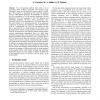Free Online Productivity Tools
i2Speak
i2Symbol
i2OCR
iTex2Img
iWeb2Print
iWeb2Shot
i2Type
iPdf2Split
iPdf2Merge
i2Bopomofo
i2Arabic
i2Style
i2Image
i2PDF
iLatex2Rtf
Sci2ools
102
click to vote
PUK
2000
2000
Scheduling in a Planning Environment
In a real planning problem, there exists a set of constraints (both temporal constraints and resource usage constraints) which must be satisfied in order to obtain a feasible plan. This requires a scheduling process (after the planning process) which should guarantee the availability of resources and the satisfiability of all the problem constraints. Several approaches have been proposed to deal with planning and scheduling problems. However, these approaches have drawbacks which will be presented here. This paper deals with the main features of a scheduling process in an integrated architecture of planning and scheduling, where both processes work in a simultaneous way. Thus, the executability of each plan is guaranteed as it is being obtained by the planner. The planning process searches among alternative partial plans, where each one of them has its own ordering relations among actions, resource requirements, intermediate states, etc. Since these constraints are provided while the p...
Related Content
| Added | 01 Nov 2010 |
| Updated | 01 Nov 2010 |
| Type | Conference |
| Year | 2000 |
| Where | PUK |
| Authors | Antonio Garrido Tejero, Miguel A. Salido, Federico Barber |
Comments (0)

